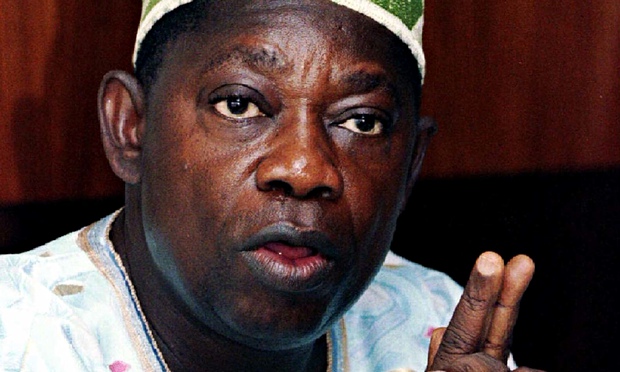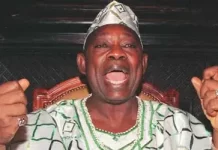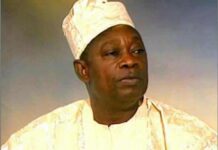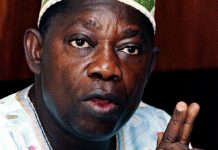
“I was returning from one of such trips to a prominent Emir one afternoon when I heard from my car radio Chief Abiola calling on General Abacha to come and ease Chief Shonekan as he eased out Babangida, I was shocked.
I called Chief Abiola and asked for an explanation of what I had just heard.
His reply was, “Mr. Chairman, I am very happy to have worked for you. You are a strong-willed man, but you see, if you want to go to Kano by road and you later decide to go to Kano by air, as long as you get to Kano, there is nothing wrong with that”.
At this time, the party did not know and I did not know Chief Abiola was having discussions with General Abacha who had promised him that if Chief Abiola supported, and if he, General Abacha, took over from Chief Shonekan today, he would hand-over the reins of Government to Chief Abiola the next day, and Chief Abiola bought the idea.
We later got to know that there were series of meetings in Ikeja where names of those who would serve in Abacha government were discussed and forwarded. When we found out that things were not moving well and that the interim government was a lame duck, I went to have a meeting with the then Secretary for agriculture, Alhaji Isa Muhammed, and I expressed my disgust at the way the government was being run.
On two occasions, I addressed the Federal Executive Council under Chief Shonekan when the two Chairmen were invited.
On the first occasion, I told Chief Ernest Shonekan that the relationship between the governors and the interim government left much to be desired as there was no discipline. Chief Shonekan picked up a copy of the constitution and said, “Chairman of SDP, I will go by this document. I have to obey this constitution. If any governor has misbehaved report him to the police”.
The second time we were called on an issue in the chambers when the Federal Executive Council was meeting, again I raised the alarm and I again told Chief Shonekan that one day, the military boys will come and drive him out of his seat.
Chief Adelusi Adeluyi (Juli Pharmacy) who was the Secretary for Health got up and told his colleagues that the Chairman of SDP had twice given warning signals and no one seemed to be taking the warnings seriously.
We again left and allowed the Federal Executive Council to continue its meeting. On this very day, I went to the Secretary for Agriculture, Isa Mohammed, and had discussions on the unsatisfactory state of affairs. He was a personal friend and he promised to see Chief Shonekan that evening with a promise to get back to me, no matter how late.
I waited until about 1 a.m. and slept off without hearing from him. In the afternoon the following day, I called him to remind him of our discussion and he said it was not possible to see Chief Shonekan the previous evening as there were too many visitors and friends. He added that they had just been called to the villa for an emergency meeting and that he would stay behind after that meeting to discuss with Chief Shonekan.
Isa Mohammed admitted that he too was also disturbed by the situation.
Immediately we stopped talking on the telephone, the British High Commissioner called me on my mobile and said, “Tony, something is happening”. And I just asked, “What is it?” He replied, “change of government” and just switched off.
I was with the Deputy Senate President, Senator Albert Legogie, when I got the message.
I went back to the house not knowing that General Abacha was taking over from Chief Shonekan which explains why the secretaries (Ministers) were called to the Villa for the emergency meeting. This was the end of the Interim Government.
It must be stated categorically here that when Chief M.K.O Abiola decided to wage war against the Interim National Government so he could take-over against the Government almost immediately Chief Shonekan was removed, he thus broke faith, not only with his party and its leadership, but also with the two political parties (SDP and NRC) which had laboured to set up the ING through effective resistance to the Federal Military Government of General Babangida.
Instead, Chief Abiola recruited “friends and supporters” who were not from the social democratic Party although some of them belonged to that party. This was to further his personal design for realizing that famous metaphor of going to Kano by air instead of road.
Immediately Abacha took over, Chief Abiola led his “friends” to pay a courtesy call on General Abacha to congratulate him. General Abacha took advantage of this and made sure that for the next two week, this courtesy call was aired on NTA Network News, to prove that Abiola had accepted his take-over of government. As stated already, the two parties had agreed in sharing ministerial offices with the reinstatement of Chief Abiola after the interim period. That arrangement, as far as Chief Abiola was concerned, was going to be too slow for his purpose.
His friends and supporters, not the party, were fully aware of the plan to topple Shonekan. They worked for it and canvassed for it. They were apparently not aware that in doing so, they were going to enthrone or ride on the back of a tiger. The long history of military rule in Nigeria and Abacha’s role in announcing most of the military coups would have been sufficient warning that they were parleying witha dangerous customer.
The tragedy of the Interim National Government was that Chief Shonekan never enjoyed the support of Chief M.K.O Abiola, the people of his home state and the people from his geo-political area, or the South-Western part of Nigeria. They did everything to bring Shonekan and his interim administration down from press attacks, to legal judgments, to hijacking of the A310 Air Bus, all in an attempt to create the atmosphere of lawlessness or the breakdown of law and order.
The Interim National Government fell due to the adroit manoeuvres of Chief Abiola, orchestrated attacks from Abiola’s supporters, as well as the lack of political base and support for Chief Ernest Shonekan who had good intentions for the country. In governance and politics, good intentions are not sufficient to sustain any leader in office. These have to be matched by effective control of the situation, ability to monitor the political pendulum to know which wat it swings at any time, as well as intelligent anticipation to develop strategies to confront emerging challenges.
Above all, political base and support are indispensable. Ernest Shonekan did not appear to have mastered the Nigerian situation, and when he was faced with scheming and planned hostility, he could not survive. In fact, his rule can be described as a tragedy of good intentions. Chief Shonekan is a good man but not a politician.
When the Abacha take-over was announced, there was jubilation by all those who knew of the “Agreement” between Chief M.K.O Abiola and General Abacha.
The Nicon Noga Hilton Hotel was in celebration mood as all those senators who had pre-knowledge of this so-called agreement, and who anticipated that Abacha would handover to Chief Abiola the next day or immediately, were shouting “M.K.O.! M.K.O.! Presido! Presido!”. It was for this same reason that, unknown to the party leadership; Chief Abiola led a team of supporters and relations as well as friends on a visit to congratulate General Abacha for a job well done.
It can now be recalled that during the ensuing struggle with Abacha to validate the June 12 election, and in order to prove that Chief Abiola was in full support of what he had done, General Abacha would play the tape of this visit repeatedly on Network News.
Four days before the June 12 election, (i.e. Wednesday), I flew in from Abuja to meet Chief M.K.O. Abiola to tell him that we had no money to pay polling agents as the promise made by government to grant the sum of ₦40 million (forty million naira) to each of the parties had deliberately not been fulfilled.
The government refused to release the money. Chief Abiola said he did not have money. I went to Universal Trust Bank to see Godson Esejele, later Executive Director (Finance), Federal Housing Authority, who was the Assistant General Manager of that bank. He told me that by 10:00 am the next day (Thursday) he would arrange ₦15 million (fifteen million naira) for us. The only condition attached was that if the promised ₦40 million (forty million naira) from the government got to the party, we should open an account with the bank with that amount.
I drove to Ikeja to see Chief Abiola and gave a rundown of the arrangement I was making. He thanked me heartily but added that if he had known, he would have told me to request for ₦20 million (twenty million naira) because of some of his commitments he was unable to meet at the time. The Federal Government was owing him heavily.
I must admit that Chief Abiola spent a great deal of his money. He was all out to win the election little realising that his best friend was going to be his worst enemy. He was a good candidate. There was no where we went to that he did not have something to show that he helped the people of that area. Although he was a Moslem, while building mosques for Moslem communities, he was also building churches for Christians.
He gave out scholarships to both Christians and Moslems; to Yoruba people, Igbos, and Hausa, without discrimination. He was a very good candidate.
I went back to the hotel and met Godson who said that if we wanted ₦20 million (twenty million naira), the money would not be ready by 10:00 am. We would have to wait till about 12:00 noon. By 11:30 am the next morning, Godson called me to say the money was ready. I went to the bank in Victoria Island and two bullion vans were ready with escort.
When I asked for a bond for the amount, the Managing Director dais, “we know you. When you get your cheque, you should open an account here”. I did not sign any document or undertaking that I was taking that money from the bank which illustrates what trust and credibility, or integrity can mean at critical moments.
I telephoned Chief M.K.O. Abiola that I was coming to the private wing of the local airport at Ikeja and that he should meet me there. I met him waiting with Kola and Habib bank manager from Apapa, and we realized that as it was already Thursday and election was just two days away, the “Hope 93” aircraft was insufficient for distributing money country-wide. We decided, therefore to charter an Okada aircraft for distributing money in the Northern states while “Hope 93” was to distribute the money in the Southern states for the payment of polling agents.
That evening, I went by road to Edo state and delivered the money for that State to Chief Odigie-Oyegun because I had to stay in Edo state for the election. I got to Benin City by 10 pm that day. When we eventually got the ₦40 million (forty million naira), we kept our promise and made sure that the ₦40 million (forty million naira) was used to open an account with UTB (Universal Trust Bank).
Air Borne But No Landing
Chief M.K.O Abiola, as indicated earlier, had said that if you want to go to Kano, going by air or by road does not make any difference as long as you get there.
His interpretation of this was that going by air meant Abacha taking over from Shonekan and he Abiola, being sworn in the next day. Going by road was waiting till March, 1994, when Shonekan would use the National Assembly to hand over to him because he actually had won the presidential election. Unfortunately for Chief Abiola, he was air borne on his way to Kano but could not land.
There was, in fact, no landing, and Kano as the desired destination proved to be a fantasy.
It is a pity indeed, that Chief Abiola kept the leadership of the party away from his arrangement with General Abacha to takeover form Shonekan. If he had brought it to the notice of the leadership of the part, he would have been well advised.
The “Agreement” was phoney and hollow. It was an agreement which was inexplicable and in excusable in its folly and terrible in its consequences. In a similar but not identical set of circumstances, I had advised Chief Abiola against declaring himself the president of this country when arising from Abacha’s refusal to handover to him drove him to that extreme line of thought.
I spoke to him on the telephone pointing out that the army was not there to back him up. He had no police support, and not even the immigration or customs would back him.
My Advice to M.K.O. Abiola
I advised against his intended line of action. In reply he merely said, “Mr. Chairman, you are a very good man. Anyway, we shall discuss that one later”, and he replaced the telephone.
As I did not want to be blamed later for not advising Chief Abiola correctly, I advertised my advice the following day in some of the daily newspapers.
It was clear to me that the course of action to which Chief M.K.O. Abiola was heading was not only going to be self-destructive but also ruinous. He would play into the hands of the military and offer himself as a sacrificial lamb by delivering himself to those who, for various and obvious reasons, very much wanted him out of the scene.
In addition to giving M.K.O. Abiola specific advice against his intended line of action, I also commented on those calling for a boycott of the election to select candidates to the constitutional conference which the Abacha regime was putting in place to address the various problems confronting the nation and putting out a new Constitution for Nigeria. I was convinced that the conference would achieve a lotfor this country, including setting the timeframe for the military’s exit from Nigerian politics.
Chief Abiola did not listen. The result of his action landed him in jail.
The Escape
While negotiations for the Interim Government were on, I was briefing Chief Abiola from time to time. One day, as we were going in for one of those meetingsat the villa, Chief Abiola told me that he had a message he wanted me to pass on to President Babangida and that he would send it by fax. I never received any fax message for onward transmission to the president because that was the day M.K.O. Abiola left Nigeria for the United Kingdom.
He did not want me to know that he was leaving the country. The following morning, I waited and waited all in vain for that fax message. I never received it till I was almost running late to attend a meeting at the villa. My other party men were waiting and we had to go. The next morning a BBC correspondent from London called me and asked if I was the chairman of SDP. On answering yes, he said, “your candidate is here”. I asked, “Which candidate?” and he answered. “Chief M.K.O. Abiola”. I was forced to ask him, “Where are you speaking from?” He replied, “This is BBC London. Do you want to hear his voice?”.
It was then I knew Chief Abiola had left the country.
Chief Abiola’s absence from the country at this critical time was disastrous to the party and to the party and to his cause. He was the symbol of theJune 12 election and most Nigerians were struggling for him. Escaping from the scene created a vacuum which made the struggle meaningless. It was the climax of the fear he had exhibited right from the time President Babangida nullified the June 12 election.
When Chief Abiola eventually returned, he visited me in Benin in my residence. One of the questions I asked him was, “Presido, I was the last person you spoke to on the day you left and you did not tell me that you were travelling?” Before the full glare of camera lights and press, he replied that “when two birds are on a tree, one does not tell the other that a stone is coming”. So he knew a stone was coming and we were two birds on a tree and he fled without telling me a stone was coming”. It seemed to me and to many Nigerians too, that the parable of birds on a tree was a very loaded and pregnant one. It shows the character of Chief M.K.O. Abiola whose cause many Nigerians were prepared to fight and die for. Today, the result of his action has been extremely unfortunate.”
[‘My Life And Nigerian Politics’ Chief Anthony Anenih , Mindex Publishing Co.Ltd, 2016; pp.108-118].
Kindly contact us @ Naijalivetv@gmail.com
Call or Whatsapp: 07035262029, 07016666694, 08129340000










